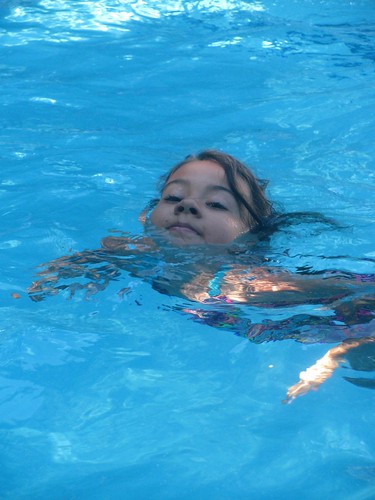CC licensed photo shared by Flickr user edenpictures
When my nephew Jack was five years old, he was afraid to swim in the deep end. My sister, Jennifer, put him in swimming lessons but Jack politely refused to go into the deep end of the pool with his swimming teacher. I had a pool in my backyard and Jen asked if she could bring Jack over during the summer to practise. I suggested she also bring a friend for Jack, someone who could swim a bit better than himself.
I had noticed over the years that my own children didn't try to copy accomplished swimmers when they were learning to swim, but if they saw a peer, someone who was just a bit better at swimming than they, trying out new things in the water, they would watch carefully, and then attempt it themselves.
This observation proved true for Jack as well. He came swimming with his little friend Natalie. Natalie was a novice swimmer as well, but she was just a bit more daring. As she dog-paddled across the width of the pool in the deep end, Jack studied her, and it wasn't long before he was doing it too. The next thing we knew, he and Natalie were challenging one another to jump in, or to swim the length of the pool; they even made a "slide" out of a float and slid into the deep end laughing and screaming.
My etmooc experience has been very similar to Jack's swimming journey. I have enjoyed the webinars greatly, but sometimes, the information is over my head and I have to watch the archived videos again and again to try to understand. (It is driving my husband nuts!). I have also been following most of the Google+ Etmooc Community posts, but many of my fellow etmoocers are experienced tech users with professions in IT and much of what they share is beyond my scope.
Just like Jack, the people I learn most from are my peers, the etmoocers who know just a bit more than I do. I think this is why the networking component of the etmooc is so critical. I also think this is why I have been enjoying and learning so much in the etmooc. Reading a range of all of the posts, I have found that I understand some posts better than others - those are the people I follow and network with, we learn together that way.
Vygostsky's Zone of Proximal Development suggests that I learn best when a task is just slightly out of my reach and I am supported in learning how to accomplish that task (in school, we call this "guided instruction"). Sometimes, an expert isn't the best person to support me in that learning, they simply know too much, and perhaps forget how little I know. But if I learn with someone within my ZPD, someone who knows just a bit more than I do, we can support one another to accomplish things we couldn't do alone.
This video is a quick refresher on ZPD:
The same holds true in my classroom. I need to talk less and let my students talk more because it is through the conversations they have with one another that most of their learning will take place.

Lorraine,
ReplyDeleteI have felt this lately... I've been frustrated with teachers, though. It suddenly hit me the other day that THEY are not quite ready for Twitter, or blogging, or letting students own their own learning. They have to be ready before I can be an influence. I have to keep this in mind, because I could have started on Twitter a year earlier, or two, but I wasn't ready. I don't know what finally made me ready, or made me start my blog, but I did when I was in the zone... Sure, I try to keep it in mind when I think of students, but thinking of other teachers was another matter altogether. Am I making sense, or am I rambling, like usual?! Thanks for this post & video!